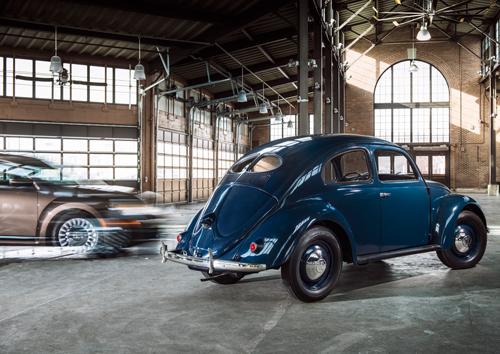John Oxley looks into the scandals that have forged Volkswagen’s history. The latest is not the first by any means – will it be the last?
The Volkswagen emissions scandal has opened a whole can of worms, and I’m not going into latest detail here as by the time you read this the details will most likely have changed!
What I’d like to talk about is the remarkable, and for most people, hidden, history of Volkswagen, and its singular association with scandals.
It’s common knowledge that Volkswagen started life because, just before World War 2, Adolf Hitler wanted a German car that the people could afford – the name means “People’s car”. Up to then German cars had been expensive luxury vehicles which only the rich could afford.
Hitler wanted the equivalent of America’s Model T, a car which was affordable, and could transport two adults and three children at up to 100km/h. And he wanted to offer a savings plan to make it available.
Although other German companies had been working on small cars, they couldn’t get the price down low enough, and it became apparent that the project would require state funding to realise Hitler’s dreams.
Ferdinand Porsche, a well-known designer in the motor industry of the time, had been working on his own ideas for a small car, but under pressure from Hitler to produce a final design, he is said to have largely copied the existing small and affordable Czechoslovakian Tatra T97, which had a rear-mounted flat four air-cooled engine, and an aerodynamic shape. Porsche designed a different body, and added torsion bar suspension, but the cars in essence were remarkably similar..
The Beetle was born, and the rest we all know, so I’m not going to say more than that the Beetle went on to become hugely successful, laying the foundations for the Volkswagen Group that we know today.
After the war the Allies re-opened the Volkswagen plant in Fallersleben (later re-named Wolfsburg) to produce Beetles, but it wasn’t without controversy, as the Tatra company, which had launched a copyright claim against Volkswagen before the war, reinstated its law suit. The claim had been stopped by Hitler’s invasion of Czechoslovakia, and production of the Tatra T97 had been terminated.
It took a long time, but in 1965 Tatra was eventually paid out 1-million Deutsche Marks in compensation, by which time millions of Beetles had been sold around the world. Buyers liked them because they were reliable, well-built and didn’t rust, unlike most of the other small cars around at the time. Tatra, meanwhile, was only building a handful of cars, and eventually went out of business.
Fast-forward to 1971, and American Ralph Nader and his Centre for Auto Safety pilloried the Beetle for “serious design defects … responsible for the deaths and injuries of thousands of people”.
Nader’s claims were flawed in that the report neglected to state that the Beetle had been through a number of design changes which made it handle better than the original cars, but the damage was done. Clearly a new car was needed, and the answer was the Volkswagen Golf, as different as one could get from the Beetle, with its front-wheel-drive, in-line four-cylinder transverse engine, and five-door hatchback design.
The Volkswagen Group, which by now also encompassed Audi (and Auto Union), had experience in producing front-wheel drive cars dating back to the DKWs of the post-war years, and there were already other role models on the global automotive stage in the shape of the original Mini and the Renault 5.
Volkswagen chose renowned Italian designer Giorgio Giugiaro to style the Golf, and it was an instant hit.
But Volkswagen’s woes were not over, and the “S” word – scandal – raised its head again in 1987, when the motor industry was rocked by the news that VW had uncovered foreign exchange fraud involving the company, and had made provision for potential losses of US$259-million, around half its profit for the year.
This time it wasn’t Volkswagen’s fault – the fraudsters, who were eventually caught and jailed, had hacked Volkswagen’s computer systems and manipulated foreign exchange accounts.
Even so, it was a major setback for VW, and its chief financial officer did not renew his employment contract. The fraud caused VW shares to plummet by about a third, and led to the German Government postponing plans to sell a 16 percent stake in VW. This was a big setback for Germany, as the proceeds of the sale would have enabled the government to cut down the country’s budget deficit.
But despite that setback Volkswagen continued to grow, and with it what has been described as the “Wolfsburg Fortress Mentality” – VW managers felt they were untouchable.
So it was no surprise, really, that the “S” word raised its head again in 2005, when it was revealed that VW bosses had colluded with a union leader to keep wage demands down and the production lines running.
Over a period of nine years 2.5-million Euros had been paid into the bank account of the VW works council chief, and he used the money to throw lavish sex parties to get union representatives into compromising situations. A German MP who sat on the IG Metal Union, and would have a veto on the VW employment reforms, was also implicated.
In the end relatively low-level VW employees took the rap, one being fined heavily, another getting a suspended jail sentence, while the union official who doled out the sex cash got a three-year jail term for accepting “improper bonuses”.
The court case also resulted in other claims being made, and German newspaper Der Speigel reported at the time that VW managers had been involved in wild parties while travelling overseas, with Viagra pills handed out freely, and huge hotel bills racked up.
One former Skoda manager was even accused of soliciting a massive bribe from an Indian provincial government to get VW to build a factory there!
Meanwhile, VW’s top brass got off scot-free. In court giving evidence, then-chairman Ferdinand Piech said the affair was mere “irregularities” about which he had “not been aware”.
Porsche
Let’s sidestep for a minute. The Porsche sports car company had been founded by Ferry Porsche, Ferdinand Porsche’s son, after WW2, with the original cars based very much on Beetle running gear.
As a pure sports car company Porsche did all right, but by the beginning of early 1990 was starting to feel the pinch a bit. In January of that year Ferry, who was then 80, stepped down from leadership of the company in favour of his son Ferdinand Alexander, who had designed the legendary Porsche 911 in 1963.
It was a good move, and when Porsche (in collaboration with VW) designed and started production of an SUV, the Cayenne, in 2002, its fortunes stepped up considerably, at a time when interest in SUVs was growing around the world. Porsche started to make real money.
Porsche had always been a family business, owned by the German Porsche family and the Austrian Piech family. Louise Porsche, daughter of Ferdinand and his wife Aloisia, had married Anton Piech.
Their son, Ferdinand Karl Piech, was born in 1937, and started his working life at Porsche, only to be sent off to Audi when it was decided that no family member would be involved in the day-to-day running of Porsche, although Wolfgang Porsche, youngest son of Ferry, became chairman of Porsche in 2007 – as well as being a member of the VW board.
Piech was credited with growing Audi into a premier company, and in 1993 he became chairman and CEO of the Volkswagen Group. He had plans to enlarge the group further – VW had already bought out or taken stakes in Skoda and SEAT, and owned Audi – and he was the man behind the acquisition of Lamborghini, Bentley, and Bugatti.
An extraordinary event took place in the months leading up to May 2009. On that date, Porsche and Volkswagen Group announced they would merge. It was an announcement that terminated months of dissent between the Porsche and Piech families about which company would own the other, with Porsche at one stage announcing that it would take over VW – plans which were stymied by a shortage of real funds to buy enough shares.
The affair resulted in the Porsche headquarters in Zuffenhausen being raided by the police as part of an investigation into wheeler-dealing, with claims that Porsche had manipulated share options to artificially build up its stake in Volkswagen.
After that Piech reigned supreme as chairman at VW for another six years, but like everything else about this remarkable company, his end was nie.
In April this year he was forced to step down after a boardroom showdown with chief executive Martin Winterkorn. First and foremost an engineer, Winterkorn had come up through the ranks, via VW and Porsche, and had achieved his position very much thanks to the mentoring of Piech.
However, they had a falling out when Piech criticised Winterkorn’s performance – which up to that time had been exemplary, as indicated by the fact that VW ended the first half of this year as the world’s best-selling vehicle manufacturer – and Piech was ousted from the board.
In another extraordinary aside, this immediately led to Volkswagen Group announcing it had plans to enter Formula One, and was in talks with Red Bull, a move which Piech had until then blocked. Whether these plans will go any further remains to be seen, with Volkswagen Group of necessity being faced with setting austerity plans into place.
And so we come to the latest news, as I write, that Winterkorn’s reign was short-lived, just five short months, and he has resigned and faces possible fraud charges over the emissions scandal.
In another irony, it is the former head of Porsche, Matthias Muller, who has been chosen to replace Winterkorn.
What a story, what a film script! But whatever happens in the coming months, and years, one thing you can be sure of. People’s memories are short, and their attention spans even shorter, and this latest scandal will be forgotten just as quickly as all the rest.
Volkswagen has survived before, and I believe it will survive this time, too, although it will undoubtedly lose the global sales leadership it has gripped so hard this year. And even though the doubters are saying diesel sales will drop, I believe they will continue to rise, since they currently present the best way forward to meet Euro6 and above emissions standards.
But arising from all this is perhaps a silver lining for the sales of petrol hybrid, plug-in hybrid, and pure electric cars. Seemingly bogged in a sea of apathy from potential owners, this may well be the miracle they have been waiting for to get people to buy out of diesel and into electric (in one form or another).
Or not. Only time will tell.






